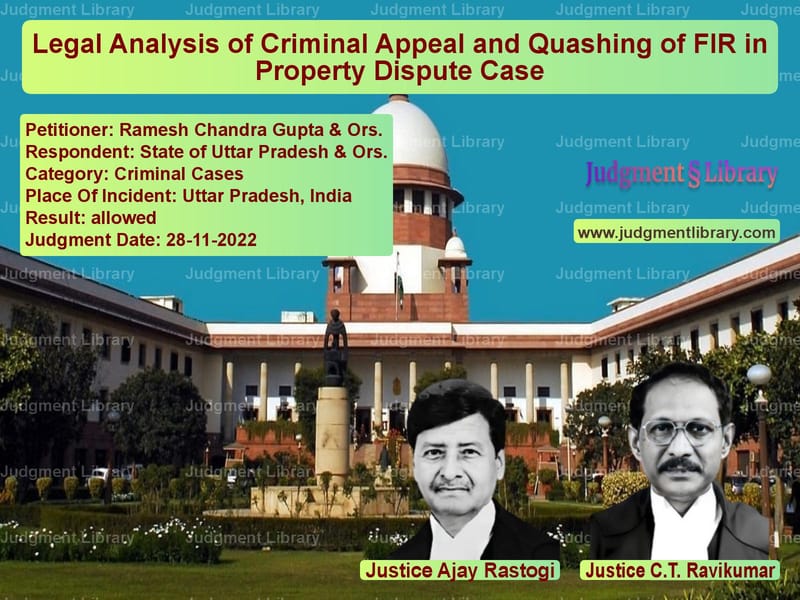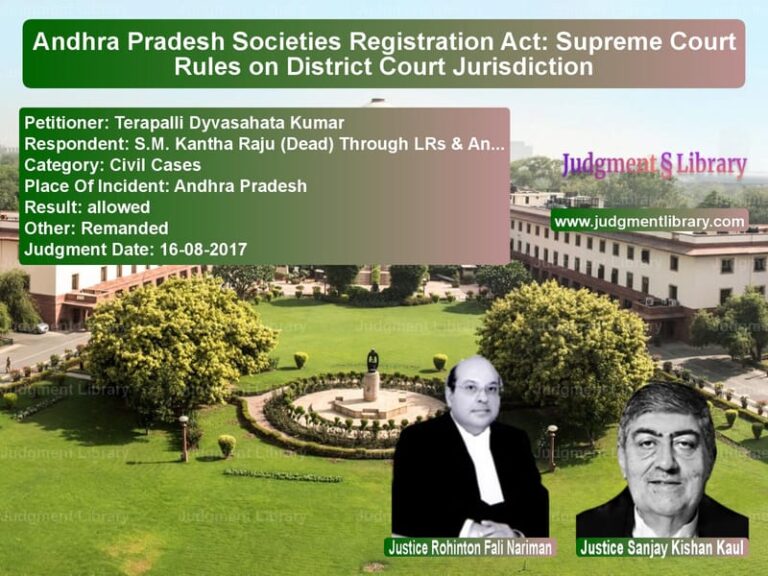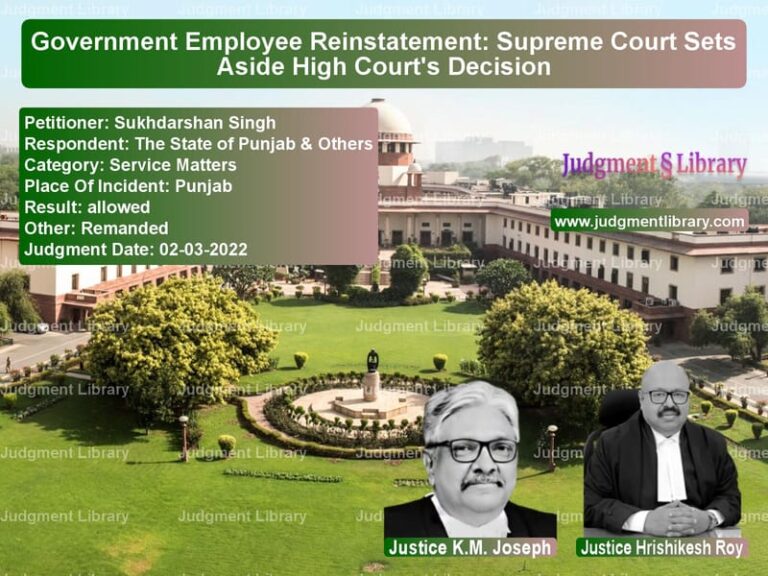Legal Analysis of Criminal Appeal and Quashing of FIR in Property Dispute Case
The Supreme Court recently adjudicated the matter in the criminal appeal of Ramesh Chandra Gupta & Ors. v. State of Uttar Pradesh & Ors., concerning a property dispute and the criminal charges filed against the appellants. The case arose from an FIR filed by Atul Shukla, the de-facto complainant, alleging that he was dispossessed of a property, following a forged sale deed executed by Shravan Kumar Gupta, and that his house had been illegally locked and taken over by the appellants. The appeal questioned whether the High Court was correct in dismissing the criminal proceedings initiated by the complainant.
Background of the Case
The dispute in question involved House No. 189, Mohalla Madia, Kanpur Road, Jhansi. The property was originally purchased in the name of Shravan Kumar Gupta, who was a minor at the time of purchase. Later, a family settlement among the descendants of Raja Ram Gupta occurred, wherein the house was allocated to Vinod Kumar Gupta as part of the family arrangement, and a Memorandum of Understanding (MoU) was executed in 2006. Subsequently, the de-facto complainant, Atul Shukla, purchased the property from Shravan Kumar Gupta through a registered sale deed dated December 22, 2018.
Read also: https://judgmentlibrary.com/supreme-court-acquits-college-officials-in-student-suicide-case/
After Atul Shukla took possession of the property, he alleged that he was forcibly dispossessed by the appellants, including Vinod Kumar Gupta, Ashish Gupta, and Ramesh Chandra Gupta, who were members of the same family. Atul Shukla then lodged a complaint, leading to the registration of an FIR under Sections 420, 467, 468, 471, 504, 506, 447, and 386 of the IPC, accusing the appellants of cheating, forgery, and criminal trespass. The appellants were named in the FIR but challenged the proceedings in the High Court, which dismissed their petition for quashing the FIR.
Petitioner’s Arguments
The appellants, represented by their counsel, contended that:
- Absence of Criminal Offenses: The appellants argued that the FIR did not make out any criminal offense against them. They emphasized that they were not involved in the sale transaction between Shravan Kumar Gupta and the de-facto complainant and had no role in the execution of the sale deed. They further contended that they were not parties to the family settlement agreement or the civil proceedings.
- No Connection with the Property: The appellants asserted that they were not in possession of the disputed property and that the de-facto complainant had been dispossessed by Vinod Kumar Gupta, who was the rightful owner of the property as per the family settlement. They maintained that they had not participated in the illegal possession of the property as alleged.
- Failure to Prove Alleged Criminal Acts: The appellants argued that no evidence was presented to substantiate the charges of forgery or cheating. The documents, including the sale deed, were valid, and the property was legally transferred to the complainant, with no fraudulent intentions on their part.
- Abuse of Process: The appellants claimed that the criminal proceedings were initiated with a malicious intent to harass them and were merely a tactic to put pressure on them in the ongoing civil dispute regarding the property.
Respondent’s Arguments
The de-facto complainant and the State represented their position as follows:
- Validity of the Complaint: The respondent argued that the complaint made by Atul Shukla was legitimate, as he was forcibly dispossessed from his property. The respondent further contended that the appellants, who were related to the rightful owner, were involved in the illegal act of dispossession and had been part of the conspiracy.
- Forgery and Malicious Intent: The respondent pointed out that the appellants were implicated in the forgery of documents related to the property and that this constituted cheating and criminal conspiracy. The respondent also cited the involvement of Rinky Sarna in this conspiracy, where the property had been let out to him despite the dispute.
- Continuing Criminal Activity: The respondent maintained that the acts of intimidation and threats made by the appellants to recover money from the complainant were clear evidence of criminal conduct. The respondent argued that the appellants’ actions were part of a larger plan to illegally dispossess him of his property.
Supreme Court’s Observations
The Supreme Court, led by Justices Ajay Rastogi and C.T. Ravikumar, examined the arguments and made the following observations:
- Examination of Criminal Proceedings: The Court emphasized that the High Court had failed to consider the lack of direct involvement of the appellants in the sale transaction or the alleged forgery. The Court noted that merely being related to the individuals involved in the dispute did not establish criminal liability in the absence of active participation in the alleged criminal acts.
- Quashing of FIR: The Court observed that the FIR did not disclose the commission of any cognizable offense by the appellants. The allegations of cheating, forgery, and criminal trespass were found to be unsubstantiated, and the Court held that the High Court had incorrectly dismissed the appellants’ petition for quashing the FIR.
- Abuse of Process: The Court noted that the criminal proceedings against the appellants were based on vague and generic allegations, without concrete evidence linking them to the crime. The Court pointed out that the proceedings were initiated in bad faith to exert pressure on the appellants to settle the civil dispute.
- Principles from Bhajan Lal Case: The Court referenced the well-established principles from the State of Haryana v. Bhajan Lal case, particularly the category where criminal proceedings should be quashed if they are manifestly attended with mala fide and malicious motives, as was evident in the present case.
Supreme Court’s Verdict
The Supreme Court ruled as follows:
- The Court allowed the appeals, quashing the criminal proceedings against the appellants. The Court found that the High Court had erred in not exercising its power under Section 482 CrPC to quash the criminal proceedings.
- The Court observed that the allegations against the appellants were vague and lacked any material evidence to support the charges. The criminal proceedings were dismissed, and the appellants were exonerated.
- The Court emphasized that the decision was limited to the three appellants involved and did not affect the ongoing criminal proceedings against other accused persons.
Key Takeaways from the Judgment
- Quashing of FIRs: The judgment reinforces the principle that criminal proceedings should be quashed if they are initiated with mala fide intentions or lack sufficient evidence to substantiate the allegations against the accused.
- Importance of Evidence in Criminal Trials: The ruling highlights the importance of providing concrete evidence to support allegations of forgery, cheating, or criminal conspiracy. Allegations based solely on suspicion or familial ties cannot sustain criminal proceedings.
- Judicial Oversight in Criminal Proceedings: The judgment reiterates the power of the High Court to intervene under Section 482 CrPC to quash proceedings that are manifestly unjust or frivolous, protecting individuals from harassment and undue legal burden.
Implications of the Judgment
This judgment has significant implications for criminal law in India:
- It sets a precedent for how courts should deal with criminal proceedings that are not supported by credible evidence, ensuring that the judicial process is not used as a tool for harassment.
- The ruling also clarifies the scope of Section 482 CrPC, providing guidance on how High Courts should exercise their inherent powers to quash criminal proceedings that are legally untenable.
Conclusion
The Supreme Court’s decision in Ramesh Chandra Gupta & Ors. v. State of Uttar Pradesh underscores the importance of due process and the protection of individuals from malicious prosecution. By quashing the criminal proceedings against the appellants, the Court has reinforced the principle that the judicial system should not be misused to settle personal vendettas or disputes. This judgment emphasizes the need for clear evidence and valid legal grounds in criminal cases and ensures that justice is not hindered by frivolous or unwarranted charges.
Petitioner Name: Ramesh Chandra Gupta & Ors..Respondent Name: State of Uttar Pradesh & Ors..Judgment By: Justice Ajay Rastogi, Justice C.T. Ravikumar.Place Of Incident: Uttar Pradesh, India.Judgment Date: 28-11-2022.
Don’t miss out on the full details! Download the complete judgment in PDF format below and gain valuable insights instantly!
Download Judgment: ramesh-chandra-gupta-vs-state-of-uttar-prade-supreme-court-of-india-judgment-dated-28-11-2022.pdf
Directly Download Judgment: Directly download this Judgment
See all petitions in Bail and Anticipatory Bail
See all petitions in Fraud and Forgery
See all petitions in Theft and Robbery Cases
See all petitions in SC/ST Act Case
See all petitions in Judgment by Ajay Rastogi
See all petitions in Judgment by C.T. Ravikumar
See all petitions in allowed
See all petitions in supreme court of India judgments November 2022
See all petitions in 2022 judgments
See all posts in Criminal Cases Category
See all allowed petitions in Criminal Cases Category
See all Dismissed petitions in Criminal Cases Category
See all partially allowed petitions in Criminal Cases Category







